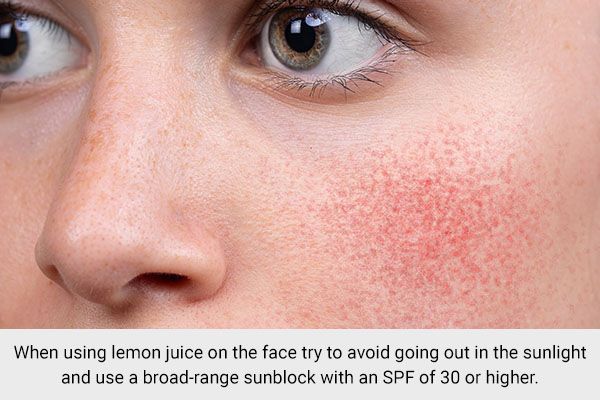In this article:
Lemons are a very widely used fruit in households around the world. They are an incredible source of vitamin C and antioxidants.

People have been using lemons for various health and beauty purposes, and one such popular practice is rubbing lemon on the face. (1)(2)
Some people believe that rubbing lemon on the face can help in reducing acne, dark spots, and other skin issues, while others believe that it can cause harm to the skin.
This article will explore the advantages and drawbacks of using lemons on the face.
Should You Rub Lemon on Your Face?
Rubbing lemon on the face can have both positive and negative effects.
On one hand, the citric acid found in lemons can aid in reducing acne and dark spots on the skin. On the other hand, it can be brutal on the skin and can result in skin irritation and increased photosensitivity.
Therefore, it is important to use lemons on the face in moderation and only if your skin can handle it. You should also water down the lemon juice before applying it to your skin.
Also, remember to apply sunscreen after using lemon extract on your skin.
How to Apply Lemon to Your Face Safely
To safely apply lemon to your face, follow these steps:
- Dilute the lemon juice: Mix equal parts of fresh lemon juice and water or aloe vera gel to dilute the acidity of lemon juice.
- Cleanse your face: Wash your face thoroughly with a mild cleanser to remove any crude or leftover cosmetics, allowing the lemon juice to be better absorbed into the skin.
- Apply the mixture: Dip a cotton ball into the diluted lemon juice mixture, and apply it gently to your face, avoiding the eye area.
- Leave it on for a short time: Leave the mixture on your face for no longer than 5–10 minutes, especially if it is your first time using it.
- Rinse it off thoroughly: Rinse your face thoroughly with cool water to remove the lemon juice mixture.
- Moisturize: Apply a light moisturizer and then a good sunscreen with at least SPF 30.
Note: It is highly recommended to do a patch test before using any new product on your skin, particularly if you have sensitive skin.
Benefits of Rubbing Lemon on the Face

Here are some possible advantages of rubbing lemon on your face.
1. Acne reduction
One of the most known advantages of rubbing lemon on the face is acne reduction.
According to studies, lemons can have acne-reducing properties due to their antibacterial and astringent properties. Lemons contain citric acid, which has antibacterial effects on the skin and can help to reduce acne-causing bacteria.
Additionally, the astringent properties of lemons can help to tighten pores and reduce excessive oil on the skin, which can contribute to acne breakouts. (3)(4)
2. Dark spot reduction
A benefit of using lemon on the skin, as shared by experts, is the reduction of dark spots.
According to research, lemons can have pigmentation-reduction and whitening actions on the skin due to their natural skin-lightening compounds. Lemons contain vitamin C, which has been demonstrated to hinder melanin (pigment accountable for skin color) production and decrease the appearance of hyperpigmentation on the skin. (5)
Another study highlights that vitamin C, which is found in abundance in lemons, can effectively reduce hyperpigmentation and brighten the skin. The review notes that vitamin C is a potent antioxidant that inhibits melanin synthesis by scavenging free radicals and preventing the oxidation of tyrosine, which is a precursor to melanin production. (6)
3. Antiaging action
According to a study, a citrus-based juice mixture can have antioxidant and antiaging activities on the skin. The study found that the juice mixture, which included lemon, grapefruit, and orange juice, exhibited strong antioxidant activity and could protect against oxidative damage caused by free radicals.
This result suggested the beneficial effect of lemon on reducing skin damage and aging caused by environmental factors such as UV radiation and pollution. (7)
Drawbacks of Rubbing Lemon on the Face

While there are some benefits to using lemon on the face, the chemicals present in lemons can be harsh on the skin, and excessive use can lead to skin damage.
Skin irritation and sensitivity to sunlight
A review of the chemistry and pharmacological properties of lemons indicated that lemon juice and its extracts may have irritant properties, especially when used in high concentrations.
Another drawback of using lemons on the face is increased photosensitivity. Lemon juice contains photosensitizing compounds such as psoralens that make the skin more vulnerable to sun radiation.
Therefore, it is advisable to avoid exposing the skin to sunlight after applying lemon juice or any other citrus juice to the skin. (4)
Another research study reported a case of phytophotodermatitis caused by lime and lemon juice in a person who made sangria. Phytophotodermatitis is a skin response that happens when a phototoxic substance in a plant or fruit comes in touch with the skin.
The signs of this condition can vary from redness and irritation to more extreme blistering and pigmentation changes. In this case, the person experienced significant blistering and discoloration on the areas of skin that came in contact with the lime and lemon juice. (8)
It is suggested that individuals using lemon juice on the face should not be out in the sunlight and should use a broad-range sunblock with an SPF of 30 or higher.
Most-Asked Questions
Is it okay to apply lemon directly on the face?
According to dermatologists, applying lemon directly on the face can be harsh and irritating, especially for those with sensitive skin. It is advised to water down lemon juice before use or use a product that contains lemon extract in lower concentrations.
Can lemon juice lighten skin tone?
Yes, lemon juice can lighten skin tone due to its natural bleaching properties. However, it should be used with caution and in moderation as it can also cause skin sensitivity and irritation. (6)
Can lemon juice cause sun damage?
Yes, applying lemon juice to the face can make the skin sensitive to sunlight and increase the risk of sun damage. (4)
How often can I use lemon juice on my face?
It is recommended to use lemon juice on the face only once or twice a week to avoid skin irritation and sensitivity.
Final Word
Rubbing lemon on the face can provide several benefits, including acne and dark spot reduction. However, the citric acid found in lemons can be brutal on the skin and can result in skin irritation and increased photosensitivity.
There are several natural alternatives to rubbing lemon on the face that can provide similar benefits without the drawbacks. It is invariably advised to confer with a dermatologist before trying any new product, especially if you have sensitive skin.
- Was this article helpful?
- YES, THANKS!NOT REALLY


